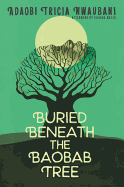
Nigerian author Adaobi Tricia Nwaubani's (I Do Not Come to You by Chance) harrowing YA debut is certain to stun readers. Especially staggering is the lengthy afterword by Italian journalist Viviana Mazza explaining that Buried Beneath the Baobab Tree is based on interviews with some of the 276 girls kidnapped by extremist group Boko Haram from the village of Chibok in Borno State, Nigeria, in 2014.
The young Nigerian narrator never tells readers her name, but her parents call her "Ya Ta," Hausa for "my daughter." The only girl in her family, she loves sharing secrets with her best friend (especially about her crush on the pastor's handsome, educated son), and also studies hard to test into a government scholarship, encouraged by her proud father. Her dreams for the future shatter when Boko Haram storms her village, murdering the men and stealing young women and children. Enslaved, beaten and starved, the girl and her friends must convert to Islam at knifepoint and marry their captors. Raped repeatedly and forced to answer to the Arabic name Salamatu, which means "safety," the heroine wonders if she will ever see home again.
Nwaubani portions out the heartrending story in brief chapters with deceptively poetic prose for such a brutal saga. Sensitivity, not sensationalism, rules this raw and important narrative. Nwaubani takes care to indicate the true villains; conversations with kind Muslim neighbors illustrate the difference between Islam and extremism. This difference is emphasized repeatedly, as with the devastating emotional response one of the girls has after being raped: " 'This is not Islam,' she says again. 'This is not Islam,' she says over and over again." Buried Beneath the Baobab Tree is a disturbing, agonizing story that will surely provide rich thought and discussion for mature readers. --Jaclyn Fulwood, youth services division manager at Main Branch, Dayton Metro Library, Dayton, Ohio

